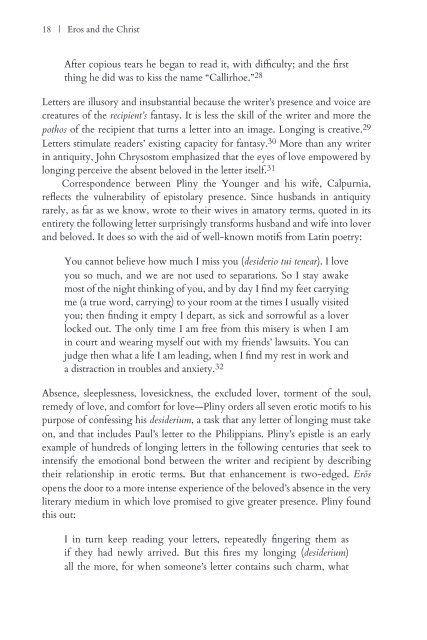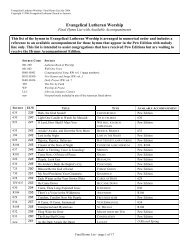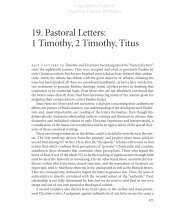Chapter 1 - Augsburg Fortress
Chapter 1 - Augsburg Fortress
Chapter 1 - Augsburg Fortress
You also want an ePaper? Increase the reach of your titles
YUMPU automatically turns print PDFs into web optimized ePapers that Google loves.
18 | Eros and the Christ<br />
After copious tears he began to read it, with difficulty; and the first<br />
thing he did was to kiss the name “Callirhoe.” 28<br />
Letters are illusory and insubstantial because the writer’s presence and voice are<br />
creatures of the recipient’s fantasy. It is less the skill of the writer and more the<br />
pothos of the recipient that turns a letter into an image. Longing is creative. 29<br />
Letters stimulate readers’ existing capacity for fantasy. 30 More than any writer<br />
in antiquity, John Chrysostom emphasized that the eyes of love empowered by<br />
longing perceive the absent beloved in the letter itself. 31<br />
Correspondence between Pliny the Younger and his wife, Calpurnia,<br />
reflects the vulnerability of epistolary presence. Since husbands in antiquity<br />
rarely, as far as we know, wrote to their wives in amatory terms, quoted in its<br />
entirety the following letter surprisingly transforms husband and wife into lover<br />
and beloved. It does so with the aid of well-known motifs from Latin poetry:<br />
You cannot believe how much I miss you (desiderio tui tenear). I love<br />
you so much, and we are not used to separations. So I stay awake<br />
most of the night thinking of you, and by day I find my feet carrying<br />
me (a true word, carrying) to your room at the times I usually visited<br />
you; then finding it empty I depart, as sick and sorrowful as a lover<br />
locked out. The only time I am free from this misery is when I am<br />
in court and wearing myself out with my friends’ lawsuits. You can<br />
judge then what a life I am leading, when I find my rest in work and<br />
a distraction in troubles and anxiety. 32<br />
Absence, sleeplessness, lovesickness, the excluded lover, torment of the soul,<br />
remedy of love, and comfort for love—Pliny orders all seven erotic motifs to his<br />
purpose of confessing his desiderium, a task that any letter of longing must take<br />
on, and that includes Paul’s letter to the Philippians. Pliny’s epistle is an early<br />
example of hundreds of longing letters in the following centuries that seek to<br />
intensify the emotional bond between the writer and recipient by describing<br />
their relationship in erotic terms. But that enhancement is two-edged. Erōs<br />
opens the door to a more intense experience of the beloved’s absence in the very<br />
literary medium in which love promised to give greater presence. Pliny found<br />
this out:<br />
I in turn keep reading your letters, repeatedly fingering them as<br />
if they had newly arrived. But this fires my longing (desiderium)<br />
all the more, for when someone’s letter contains such charm, what




